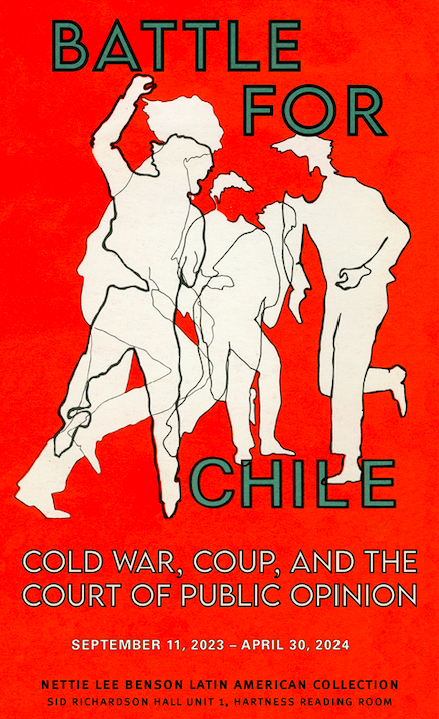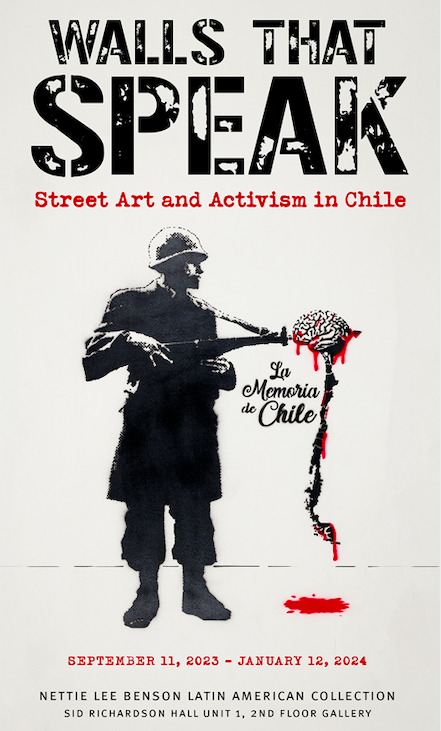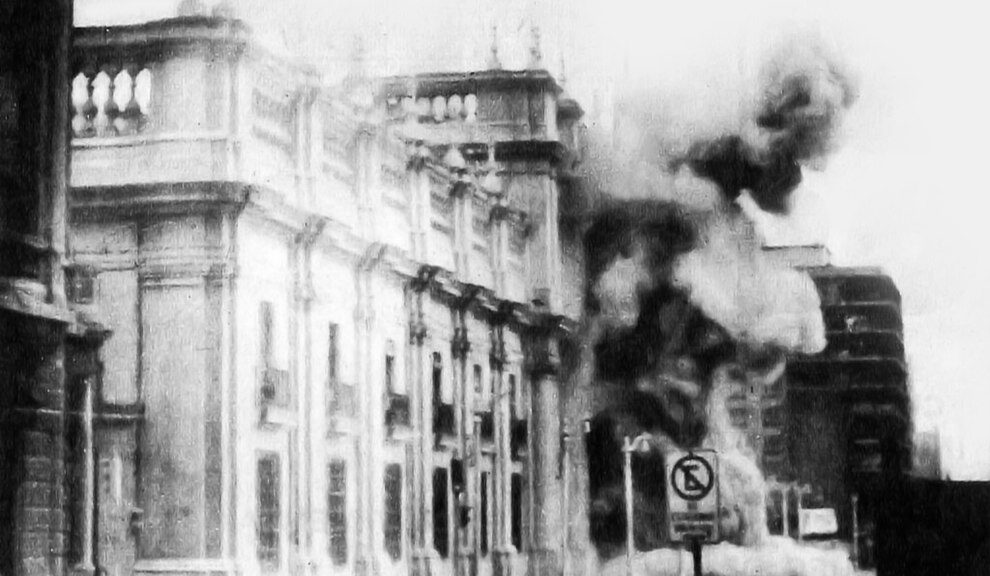Two upcoming exhibitions at the Benson Latin American Collection will focus on Chile in commemoration of the 50th anniversary of the violent coup that overthrew the government of democratically elected president Salvador Allende on September 11, 1973.
In addition, a LLILAS Benson special event, “Chile 50 Years after the Military Coup: Testimonies and Remembrances,” taking place Tuesday, September 12, features a panel of Chileans, some of whom lived through the 1973 coup, moderated by Professor of History Joshua Frens-String. The event and the exhibitions are free and open to the public.
A second public event, organized by LLILAS Benson and the Rapoport Center for Human Rights and Justice, is titled “Before and After Chile 1973: Recovering a More Just Future.” It will take place in the Benson’s 2nd floor conference room on Thursday, October 19, from 5 to 6:30 p.m.
Battle for Chile: Cold War, Coup, and the Court of Public Opinion
From September 11, 2023, through April 30, 2024, the Hartness Reading Room Gallery at the Benson Latin American Collection will host an exhibition that focuses on Chilean politics and activism in the late 1960s through the mid-1980s.
Centered on Chilean and non-Chilean individuals and entities trying to influence public and international opinion, Battle for Chile shows the country as one center of an international clash between capitalism and socialism. It focuses in particular on the high-stakes fight for international opinion as the post-coup regime continued to commit unspeakable atrocities under the guise of fighting global communism.

Reports and telegrams from the George Lister Papers show U.S. government concern over Salvador Allende’s candidacies and eventual election as well as an account of the coup in process. Sepa, an anti-Allende publication, declares his presidency illegitimate and seems to call for a military overthrow. Material distributed by the Pinochet regime and aimed at international audiences promotes reports of economic progress. Chilean and non-Chilean activists in the post-coup era work to share news of human rights violations. Anti-Pinochet and pro-Allende activists accuse the United States and other governments and corporations of creating the conditions leading to the coup or even supporting it. Transnational socialist organizations, often based in Cuba, capitalize on atrocities to build support for their cause through captivating posters and publications.
Battle for Chile is an opportunity to see some of the Benson’s extensive collection of political ephemera and rare magazines as well as selections from archival collections.
— D Ryan Lynch, Head of Special Collections & Senior Archivist, Benson Latin American Collection
Walls That Speak: Street Art and Activism in Chile
On October 18, 2019, demonstrations erupted in the streets of Chile’s capital Santiago in reaction to an increase in subway fares, along with concerns about the cost of living and social inequality. Massive protests spread across the nation, some peaceful and some devolving into vandalism. Protesters demanded the resignation of President Sebastián Piñera. This social uprising is now recognized as the most significant in the country since the end of its dictatorship almost three decades ago.
Chilean street artists emerged as participants and instigators, utilizing city walls as a canvas to express demands of the movement as well as document intergenerational trauma connected to Augusto Pinochet’s 1973–1990 dictatorship. Their artwork soon became visible on social media and served as a supportive backdrop for the Chilean demonstrators. Among those artists was Maurice Huenún, aka Pikoenelojo Stencil, who, like his peers, provided a visual narration of the protestors’ grievances and hopes for the future. His stencils explore themes of social justice, human rights, environmental concerns, political corruption, inequality, gender, anti-establishment sentiments, and reflections on local or global events.

Walls That Speak: Street Art and Activism in Chile, a fall 2023 exhibition at the Benson Latin American Collection, highlights a recent acquisition of Pikoenelojo Stencil’s work, showcasing 12 original stencil artworks crafted by this prominent Chilean street artist. The works address topics such as criticism of Piñera’s policies, privatization, international corporations, the Pinochet dictatorship, systemic police repression, criticism of Christian dogma, among other topics. The collection provides a powerful visual narrative of the violent events that occurred in October 2019 while shedding light on the enduring legacy of Chile’s painful dictatorial past.
— Veronica Valarino, Curator of Exhibitions, Benson Latin American Collection
If you go . . .
The exhibitions at the Benson Latin American Collection are free and open to the public during library hours, which are Monday–Friday, 9 a.m. to 6 p.m. The Benson is located at 2300 Red River Street.

